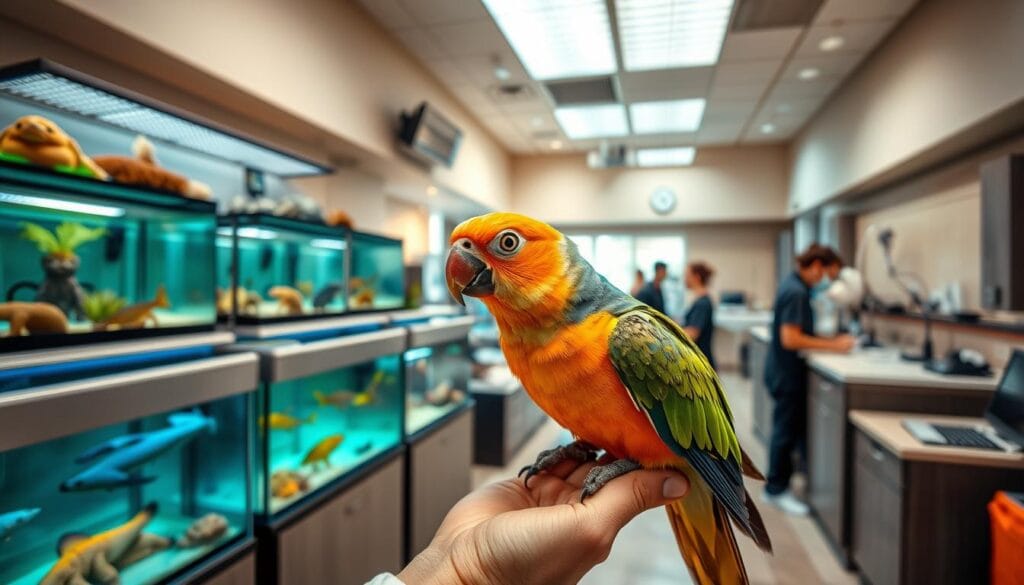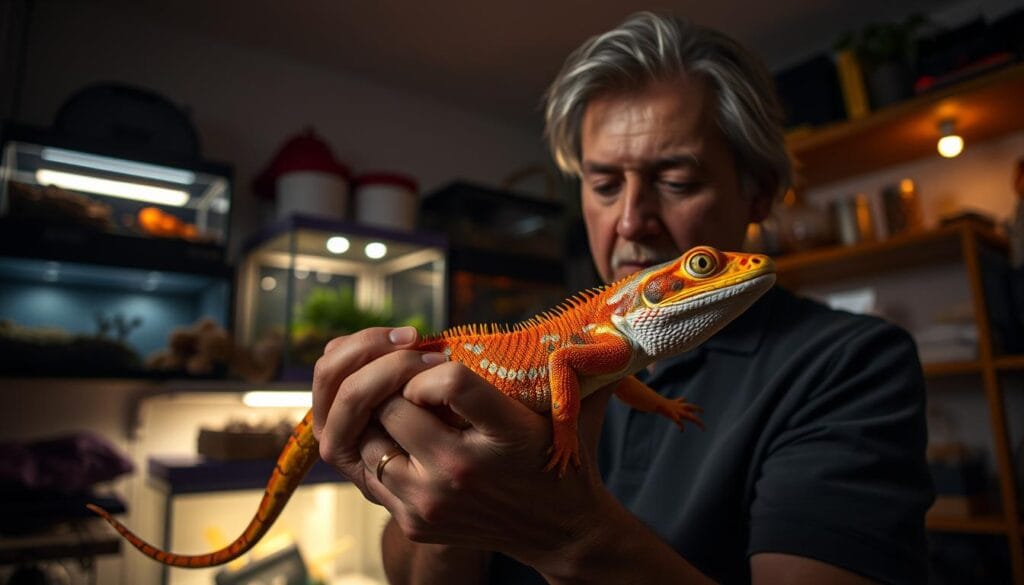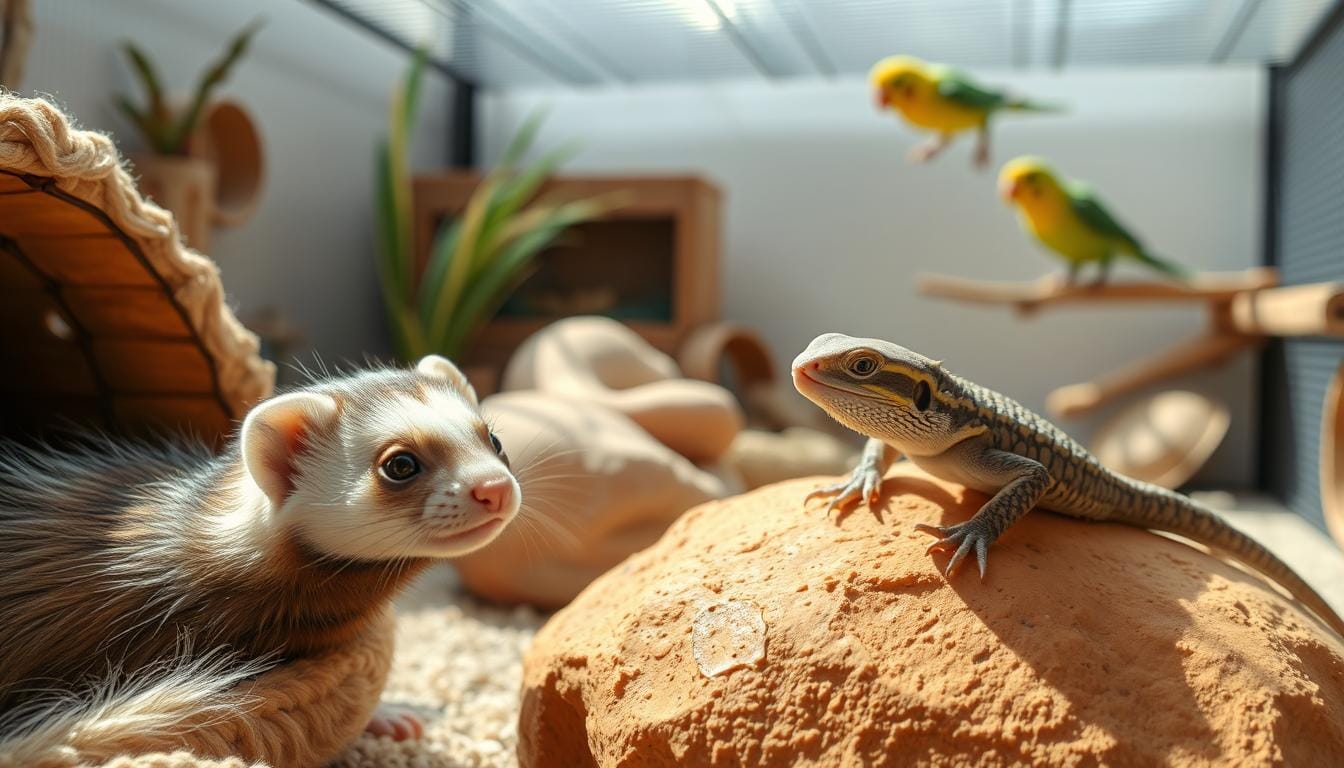Ever thought about getting a pet that’s a little different? Exotic pets are a great choice for those new to owning pets. They offer a chance to explore the world of unique animal companions. Your home could become a place of wonder and discovery.
Choosing the right exotic pet is important. They are exciting but also come with their own set of challenges. Each pet needs special care, which means you’ll need to be dedicated and patient.
The world of exotic pets is full of amazing creatures. You could have a tiny lizard or a colorful amphibian as a family member. If you’re new to exotic pets, be ready to learn and give your best care.
Table of Contents
Understanding Exotic Pets and Their Care Needs
Exploring unusual pet ownership opens a world of offbeat choices. These pets are different from dogs and cats. They challenge what we think of as typical pets.
Exotic pets are animals not found in most homes. They come from various places and need special care. This care is more than what regular pets need.
What Defines an Exotic Pet?
An exotic pet is often:
- From places not common in homes
- Wild and not usually kept as pets
- Needs special care
Benefits of Owning Exotic Pets
Having an exotic pet has many benefits:
- Unique companionship that’s different from usual pets
- Chances to learn about different animal behaviors
- May have fewer allergens
- Start interesting conversations
Common Misconceptions about Exotic Pets
Many people get exotic pets wrong. They think these pets are easy to care for. But, they’re not just “wild animals” to be kept as pets.
- Need special food
- Require specific living spaces
- Need expert vet care
- Require a lot of research and commitment
Responsible exotic pet ownership demands thorough understanding and dedicated care.
Before getting an exotic pet, think about your lifestyle and resources. Make sure you can give the right care for a long time.
Popular Beginner-friendly Exotic Pets
Starting your journey with exotic pets can be thrilling. Low-maintenance pets are great for beginners. Each animal has its own personality and needs.
Hedgehogs: Adorable Spiky Companions
Hedgehogs are gaining popularity as pets. They are small, nocturnal, and easy to care for. They need a simple home, a special diet, and don’t need much social time. Their look and calm nature make them great for new pet owners.
- Average size: 6-8 inches long
- Lifespan: 4-7 years
- Ideal for apartments and small living spaces
Guinea Pigs: Social and Gentle Starter Exotic Animals
Guinea pigs are perfect for beginners. They love to interact and bond with people. They’re easy to care for and great for families or individuals.
- Friendly and vocal personalities
- Require minimal specialized care
- Enjoyable for children and adults
Budgerigars: Charming Feathered Friends
Budgerigars, or budgies, are great for first-time bird owners. They are smart, social, and can even talk. They’re perfect for those who want a pet that interacts.
- Compact size, ideal for smaller homes
- Relatively low-maintenance
- Potential for verbal communication
Assessing Your Lifestyle Before Choosing
Choosing the right exotic pet is a big decision. Not every pet fits every lifestyle. You need to think about your time, space, and money before getting a pet.
How much time you can give to a pet matters a lot. Different pets need different amounts of care. It’s important to pick a pet that fits your lifestyle.
Time Commitment for Pet Care
Exotic pets need a lot of time for:
- Daily feeding and nutrition
- Regular habitat maintenance
- Exercise and interaction
- Grooming and health monitoring
Space Requirements
Think about how much space your pet will need. Some pets need a lot of room, while others are happy in small spaces.
- Small rodents: Compact enclosures
- Birds: Larger cages with vertical space
- Reptiles: Specialized terrariums
Budget Considerations
Having an exotic pet costs more than just buying it. You’ll also need to pay for:
- Specialized housing
- Unique dietary requirements
- Veterinary care
- Ongoing maintenance supplies
Research shows about 6% of pet owners have reptiles or small animals. This shows more people are interested in exotic pets.
By thinking about these things, you can find an exotic pet that fits your life. This way, you’ll have a great pet that you can enjoy for a long time.
Creating a Suitable Environment for Your Pet
Creating the perfect habitat is key for unique animal companions, like beginner reptile pets. Their health and happiness depend on an environment that feels like home. Setting up the right enclosure is more than just a space – it’s a home that supports their well-being.
Essential Enclosure Features
When setting up a home for your unique animal companions, consider these key elements:
- Size appropriate to your specific pet’s species
- Secure walls and escape-proof design
- Proper ventilation
- Easy access for cleaning and maintenance
Maintaining Proper Temperature and Humidity
Beginner reptile pets need specific environmental conditions. Different species have unique temperature needs:
- Bearded Dragons: 25°C to 40°C range
- Leopard Geckos: 25°C to 30°C range
- Tropical Snakes: 27°C to 30°C range
Recommended Substrates and Furnishings
Creating a naturalistic environment involves selecting the right substrates and decorative elements. For beginner reptile pets, consider:
- Substrate that mimics natural terrain
- Hiding spots and climbing structures
- Safe, non-toxic decorative elements
- Enrichment items that encourage natural behaviors
Remember, a well-designed habitat is key to your exotic pet’s long-term health and happiness!
Feeding Guidelines for Exotic Pets
Nutrition is key for the health of low-maintenance pets and easy care exotic pets. Knowing what your pet needs can keep them happy and healthy for a long time.
Exotic pets need different foods based on their species. Feeding them right is vital for their health and energy.
Common Dietary Needs
Different exotic pets need unique diets. Some important things to consider are:
- Understanding how fast your pet’s metabolism is
- Providing food that matches your pet’s needs
- Watching how much food they get and how often
Best Foods for Specific Species
Choosing the right food for your exotic pet depends on their species. Here are some tips:
- Hedgehogs: They need high-protein food and sometimes insects
- Guinea Pigs: They love fresh hay, special pellets, and veggies every day
- Budgerigars: They should eat seed mix, fresh veggies, and special pellets
Tips for Feeding and Nutrition
Keeping your pet well-fed requires attention. Here are some tips:
- Learn what your pet needs to eat
- Talk to an exotic pet vet for advice
- Don’t change their diet too fast to avoid stomach problems
- Make sure they always have fresh water
Every exotic pet is different. Watching them closely and getting vet advice will help you feed them the best.
Health Care and Regular Vet Visits

Caring for exotic pets needs special vet care, more than regular pets. As a first-time owner, knowing your pet’s health needs is key for their well-being.
It’s important to take your exotic pet for regular vet visits. Experts say to go at least once a year. Some pets might need to go twice a year to stay healthy.
Importance of Regular Health Check-ups
Special vet care is vital for exotic pets. Here’s why regular check-ups are important:
- They help find health problems early
- They offer care specific to your pet’s needs
- They help with diet and living space
- They keep an eye on your pet’s health and growth
Vaccinations and Preventative Care
Exotic pets need different care to stay healthy. Your vet can give advice that fits your pet’s needs.
| Pet Type | Annual Check-up Frequency | Common Preventative Measures |
|---|---|---|
| Bearded Dragons | Once per year | Calcium supplementation, UVB light monitoring |
| Guinea Pigs | Twice per year | Dental checks, nutrition assessment |
| Hedgehogs | Once per year | Parasite screening, weight monitoring |
Common Health Issues to Watch For
First-time owners should know about health issues in their pets. Look out for:
- Lethargy or decreased activity
- Changes in appetite
- Unusual breathing patterns
- Abnormal droppings or bathroom habits
Approximately 97% of treatable pet ailments can be successfully resolved with proper veterinary care.
Virtual vet services like Vetster make it easy to get help for your exotic pet. With costs around $80 and access to many vets, getting care is easier than ever.
Socialization and Bonding with Your Pet
Understanding your exotic pet’s social needs is key. Each pet has its own way of acting and needs special care.
Building a strong bond with your exotic pet takes patience and regular interaction. The way you interact will depend on your pet’s type.
Understanding Your Pet’s Behavior
Exotic pets show their feelings in their own way, unlike regular pets. It’s important to learn how they communicate to build trust.
- Observe body language carefully
- Recognize individual personality traits
- Learn species-specific communication methods
Daily Interaction Tips
Having a daily routine makes your pet feel safe. Regular time together boosts confidence and strengthens your bond.
- Set consistent daily interaction times
- Use gentle handling techniques
- Provide enrichment activities
- Respect your pet’s personal space
Signs of Stress or Unhappiness
Spotting stress early helps avoid bad behavior. Look out for these signs:
- Sudden changes in eating habits
- Excessive hiding
- Unusual aggression
- Repetitive behaviors
By understanding and meeting your exotic pet’s needs, you’ll have a happy and rewarding relationship. It’s all about trust and respect.
Safety Considerations for Exotic Pets

Creating a safe space is key for new exotic pet owners, like those with beginner reptiles. It’s not just about buying an animal. It’s about preparing and watching out for risks.
Exotic pets need special care that’s different from regular pets. Knowing what they need can help avoid accidents and keep everyone safe.
Pet-Proofing Your Home
To get your home ready for an exotic pet, follow these steps:
- Hide electrical dangers by covering wires
- Make a safe, locked area for their enclosure
- Get rid of small things that pets might swallow
- Keep the temperature and humidity right
Recognizing Hazardous Items
Exotic pets can be sensitive to things in your home. For reptiles, watch out for:
- Toxic cleaners
- Wrong substrates
- Too hot or cold spots
- Other pets that might harm them
Tips for Safe Handling
Handling your pet safely is very important. Learn how to do it right to keep both you and your pet calm:
- Wash your hands before and after touching
- Hold them right, supporting their whole body
- Move slowly and in a way they can follow
- Know what makes them feel safe
“Safety isn’t expensive, it’s priceless” – This is true for taking care of exotic pets.
With these safety tips, you’ll make a safe and happy home for your new exotic friend.
Finding the Right Exotic Pet Breeder or Rescue
Finding the right exotic pet source is a big deal. It’s exciting but also needs careful thought. You must do your homework before deciding.
What to Look for in a Responsible Breeder
Look for these key things in a good exotic pet breeder:
- Clean, spacious animal habitats
- Transparent health documentation
- Willingness to answer detailed questions
- Specialized knowledge about specific species
- Positive reputation in exotic pet communities
Benefits of Adopting from a Rescue
Adopting from a rescue has big pluses. They give you animal histories, behavioral checks, and care tips. Places like Panhandle Exotics focus on animal welfare, helping pets find good homes.
Questions to Ask Before Committing
Make a list of questions to ask before buying:
- What is the animal’s specific health history?
- Can you provide veterinary records?
- What are the animal’s specific dietary and habitat requirements?
- Are there any known behavioral issues?
- Do you offer post-adoption support?
Getting a pet responsibly is key for the animal’s health and your happiness. Do your research and pick carefully.
Resources for New Exotic Pet Owners
Starting with unusual pets can be daunting, but many resources are here to help. You’ll find books, online forums, and more to guide you. They ensure your new pet gets the best care.
Reading about exotic pets is a great start. Look for guides that cover many species, like rabbits and hedgehogs. Exotic Pet Haven offers detailed advice on care and health.
Online groups are a treasure trove of support. They connect you with others who know the ropes. You’ll get tips, answers, and support. Local vets and pet stores also host workshops and suggest groups for specific pets.
Learning never stops when you have an exotic pet. Keep attending workshops and joining forums. Stay in touch with vets who know about these animals. This dedication will make your bond with your pet strong and fulfilling.


1 thought on “Best Beginner-friendly Exotic Pets for New Pet Owners”
Comments are closed.